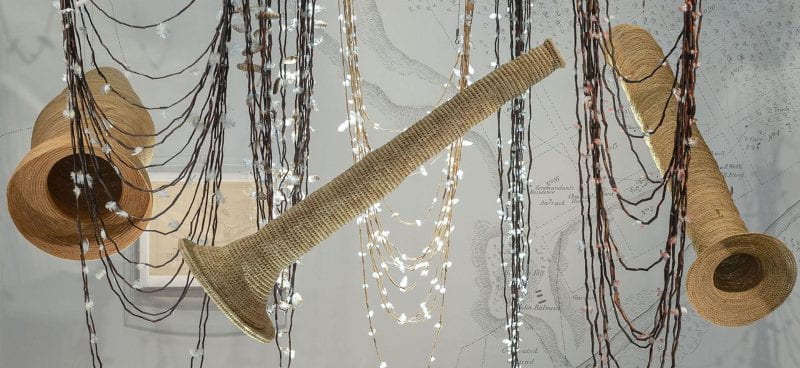
Thing 01: Indigenous Knowledges
Indigenous knowledge systems represent the oldest and longest continuing forms of knowledge production in this country. Indigenous knowledge holders are the first scientists, philosophers, and thinkers, but there has been limited engagement with Indigenous knowledge systems and limited recognition of the expertise of Indigenous knowledge holders by research institutions and universities. This is changing. Last year, the University of Melbourne made a major investment in Indigenous knowledge research with the establishment of the Indigenous Knowledge Institute. Now, more than ever, it’s critical for researchers to think about engaging with Indigenous knowledge systems in their research practice. This post was written by Aurora Milroy, Manager of the Indigenous Knowledge Institute.
Getting started
What do we mean by the term “Indigenous knowledge”? Indigenous knowledge refers to the knowledge systems, practices, and understandings developed by Indigenous peoples over a long and close relationship with the land, sky, and waters. Indigenous knowledge systems tend to be holistic, relational, and oral, but they are also innovative and have adapted and developed over time and context.
Indigenous knowledge has led to major insights and innovations across a range of fields, from health and science to leadership and performing arts. For instance, a research partnership between the University of Queensland and the Indjalandji-Dhidhanu people has led to technological innovation through the extraction of nanofibers and resin from Spinifex. Similarly, the work of Ngangkari, or traditional healers, is changing how health is delivered across some parts of Australia, with major implications for how we understand things like pain and pain management. And following the recent Australian bushfire season, there have been calls for greater research into, and implementation of, cultural burning practices as part of a holistic Indigenous land management regime which could reduce bushfire risk.
No matter what field or discipline you undertake research in, there could be many diverse opportunities to engage with Indigenous knowledge systems.
That Thing you do: integration into practice
Good relationships are central to good research
When engaging with Indigenous knowledge it is important to work in partnership with Indigenous people from the very beginning. This means developing good relationships with your local community and the communities where you plan to undertake research. A good place to start is to contact the community representative body or bodies – a land council, trust, corporation, or even a health service. In Victoria, you should work with the appropriate Registered Aboriginal Party.
Respectful and mutually beneficial partnerships take time. As one American self-help guru says, relationships go at the “speed of trust”, and you need to be willing to invest time in building a relationship with communities without rushing the initial process to meet a deadline.
Build your knowledge and find resources
The University of Melbourne library is a great place to start to build your understanding of Indigenous knowledges and find resources. Try a search in Discovery for “Indigenous knowledge” AND Australia or explore the Australian Indigenous Studies Library Guide. The University Library’s Collections team also have access to a great range of resources and cultural materials relevant to Indigenous knowledge research. As the Indigenous Knowledge Institute develops it will play a critical role in advancing research and education in Indigenous knowledge systems, and will link up researchers, communities, government, and industry.
Beyond the University of Melbourne there are a range of other online databases and resources to assist. The Australian Institute of Aboriginal and Torres Strait Islander Studies (AIATSIS) has an expansive and searchable collection of cultural materials and research, and SAGE Research Methods, and SAGE Knowledge both turn up ample resources when you search “Indigenous knowledge”.
Considerations
Ethics
When building trusting research partnerships, you should follow the AIATSIS Guidelines for Ethical Research in Australian Indigenous Studies, and the Indigenous Knowledge Institute’s Charter for Research with Indigenous Knowledge Holders.
Reflect on your research methods
One of this year’s 23 Research Things explores research methodologies (Thing 02), asking you to think critically about the “how” of your research. It’s also important to think critically about the ways in which your research methods have been shaped by your worldview and experiences. The way you approach research may have been shaped by on-Country learning, and the sharing of knowledge by your elders. Alternatively, it may have been shaped by 15 years in a Western education system. A great place to start this reflection is with Māori scholar, Linda Tuhiwai Smith’s Decolonising Methodologies: Research and Indigenous Peoples, and Opaskwayak Cree scholar Shawn Wilson’s Research is Ceremony: Indigenous Research Methods.
Intellectual and cultural property
A final consideration when getting started with Indigenous knowledge research is ensuring your research respects Indigenous cultural and intellectual property. The AIATSIS and Indigenous Knowledge Institute research guidelines provide some help with this, and you can read more about protecting Indigenous knowledge and intellectual property from Wuthathi/ Meriam lawyer Dr Terri Janke.
Learn more
- Get in touch with the Indigenous Knowledge Institute via email (Indigenous-knowledge@unimelb.edu.au), or visit our website.
- For educators and other University staff, the BC Campus Indigenisation guides provide a comprehensive journey to improve how you engage with Indigenous cultures and embed Indigenous perspectives and approaches in your work.
- For library folk, the University of British Columbia Indigenous Librarianship guide provides a wealth of great advice for developing collections.
About the author
Aurora Milroy is the Manager of the Indigenous Knowledge Institute. She is a Palyku woman from Western Australia. Aurora has previously worked as an Advisor at the Australia and New Zealand School of Government, and the Department of Prime Minister and Cabinet. She has a Masters of Public Policy from the Blavatnik School of Government at the University of Oxford.
Want more from 23 Research Things? Sign up to our mailing list to never miss a post.
Image Credit: Ancestral Memory by Maree Clarke. Photograph taken by Christian Capurro.
Categories
Leave a Reply